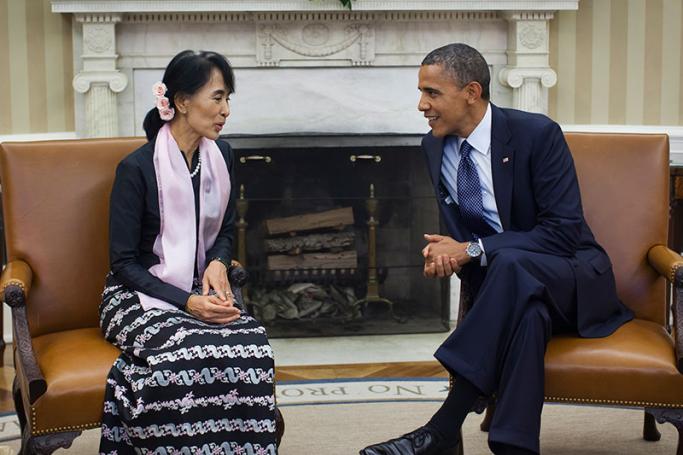President Barack Obama rolls out the red carpet for Myanmar's elected leader Aung San Suu Kyi on Wednesday, a visit that will signal her transition from democratic idol to politician.
The 71-year-old Nobel Peace Prize laureate is barred by military constitution from heading Myanmar's government, but she will still get a leader's welcome in Washington.
On her first visit to the United States since being elected last year, Suu Kyi will meet over three days with assorted cabinet secretaries, followed by talks with Obama and a coveted Oval Office grip-and-grin photo shoot.
The White House is keen to reinforce Suu Kyi's primacy as the de facto head of the government of Myanmar, also known as Burma.
In public there will be lofty rhetoric about freedom, peace and transition. But private talks between Obama and Suu Kyi are likely to focus on the nuts and bolts of governing.
After spending much of the last few decades under arrest, since her election last November she has taken the role of foreign minister and created a new position for herself as state counsellor.
As the de facto leader, she now presides over a skeletal government, an economy hollowed out by decades of kleptocratic dictatorship and a country riven with ethnic and religious violence.
The veteran campaigner must tackle all those problems while keeping an eye on still-powerful generals, lest they have second thoughts about democratic reform.
Since her election, Suu Kyi has shocked some of her more ardent Western supporters by following the junta's lead, most notably by refusing to recognize the Rohingya -- a persecuted Muslim minority group in the overwhelmingly Buddhist country.
Tens of thousands of stateless Rohingya have spent the past four years trapped in bleak displacement camps with limited access to health care and other basic services.
Privately, US officials acknowledge Suu Kyi is working with some very tough political constraints and dare not push the military, or the public, too far or too fast.
"She has to tackle problems one by one" said Ben Rhodes, a key Obama aide who has spearheaded the administration's Myanmar policy.
- US sanctions remain –
The biggest question for the Obama administration may be how far and how fast to lift remaining US sanctions.
In May, Washington lifted a host of financial and trade embargoes on state-owned banks and businesses.
But Obama has stopped short of rescinding an executive order that declares Myanmar a "national emergency" and underpins sanctions.
Scrapping that order would bring clarity to US firms thinking about doing business in Burma, helping the economy and with it Suu Kyi's government.
But it could also weaken US leverage and perhaps let the military off the hook.
Officers still control huge business conglomerates as well as crucial home, border and defense ministries.
They are also guaranteed a quarter of legislative seats, giving them a veto on the constitutional changes needed for deeper reforms -- including civilian control of the military.
"We'll want to hear from her directly about how she is viewing our sanctions regime," said Rhodes.
That may be tacit acknowledgement that the White House believes Suu Kyi -- like her father, a military officer who steered Burma toward independence from Britain -- can best navigate some perilous political shoals.
"It has been interesting to watch the transition that she has made from an icon to a politician, a democratically elected leader of a country," said Rhodes.
© AFP
You are viewing the old site.
Please update your bookmark to https://eng.mizzima.com.
Mizzima Weekly Magazine Issue...
14 December 2023
Spring Revolution Daily News f...
13 December 2023
New UK Burma sanctions welcome...
13 December 2023
Spring Revolution Daily News f...
12 December 2023
Spring Revolution Daily News f...
11 December 2023
Spring Revolution Daily News f...
08 December 2023
Spring Revolution Daily News f...
07 December 2023
Diaspora journalists increasin...
07 December 2023
Landslides kill 12 as monsoon batters refugee camps












